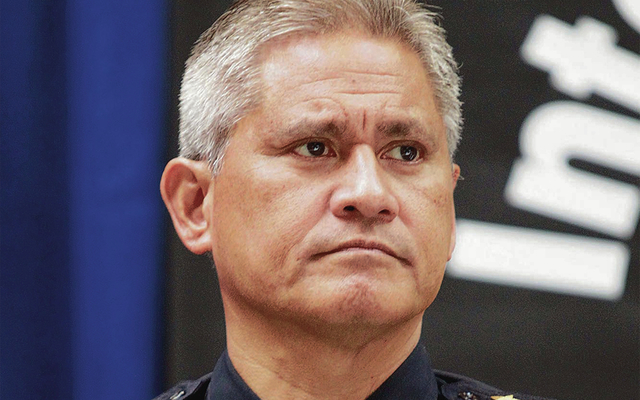A Honolulu Charter Commission subcommittee wants Oahu voters to decide whether the Police Commission should be given more authority over the Honolulu Police Department and its chief.
The proposed amendment would change the Charter to give the Police Commission:
>> The power to fire or suspend the chief “for cause.” It lists four specific criteria for doing so.
>> The authority to subpoena evidence and witnesses when it investigates public charges of misconduct against HPD or its officers.
The commission heard testimony on the proposal Thursday and will decide at its meeting Wednesday whether to advance it and send it to its Style Committee. If the commission approves the proposal, it would go before voters on the Nov. 8 general election ballot along with other proposed amendments.
Commission Chairman David Rae said it’s unlikely that the substance of the proposal will change significantly, although technically the commission has until June 30 to submit its proposals to be included on the ballot.
The issue has been proposed as current Chief Louis Kealoha is coming under fire on several fronts, including a federal investigation into actions by him and his wife, city Deputy Prosecutor Katherine Puana Kealoha. The city Ethics Commission is also investigating the chief.
The City Charter says the chief serves at the pleasure of the Police Commission, and allows the commission to remove the chief for cause. But it lists only “gross or continuous maladmin-istration” on the chief’s part as one possible cause for removal but does not specify other possible causes.
The charter also does not allow the commission to suspend the chief.
The proposed amendment specifies four criteria under which the chief could be removed or suspended. The first criterion is if the chief has committed any acts that show “a reckless disregard for the safety of the public or another law enforcement officer.”
The chief could also be removed or suspended if he or she misrepresents material facts “for any improper or unlawful purpose,” is unable to perform competently due to a mental condition or acts solely in self-interest inconsistent with the interests of the public or the commission.
The second part of the proposed amendment would give the commission the power “to subpoena and require the production of evidence” tied to an investigation of complaints by the public against police officers, and to “administer oaths to such witnesses to the extent permissible by law.” When a recommendation regarding allegations of officer misconduct is made by the commission, the chief would need to respond to the commission in writing if he disagrees with the course of action to be taken.
Currently, the charter says the commission will investigate charges brought against the department and then submit its report to the chief.
The proposed amendment came from a three- member Charter Commission subcommittee tasked with looking into HPD and Police Commission issues.
Commission member Kevin Mulligan said the subcommittee considered a number of proposals that had been submitted regarding police affairs. “We believe our recommendation will benefit the larger community by increasing transparency and accountability, and the oversight function performed by the Police Commission,” he said.
Public faith in law enforcement has become an issue both nationally and locally, Mulligan said. “We took that very seriously,” he said. “In addition, there’s an expectation that there will be more independent, objective and transparent oversight of law enforcement.”
Under the charter, “short of malfeasance or illegal activity, making the case for removal of a police chief can be difficult,” Mulligan said. “Unlike other professions where there are often clear measures of effectiveness, the effectiveness of a law enforcement agency can be subjective and influenced by a variety of variables that are subject to multiple interpretations.”
The proposal, modeled after language found in Missouri Revised Statutes and the Los Angeles City Charter, “makes it clear that the police chief is an at-will employee who is completely accountable to the Police Commission throughout the five-year term.”
Barbara Wong, an attorney for the State of Hawaii Organization of Police Officers, said the police union opposes both changes in the proposed amendment.
Wong said that last year the department disagreed with and declined to sustain a recommendation by the Police Commission only once. “I think not sustaining one is not something that needs to be fixed,” she said.
As for giving the commission broader authority into police affairs, Honolulu’s charter commissions of the 1930s and 1940s found a need “to depoliticize the Police Department,” said Wong, a longtime officer and onetime assistant chief.
“The chief often has to make choices as far as resources,” even if those decisions might upset politicians, she said.
Ryan Toyomura, spokesman for state Sen. Will Espero, chairman of the Senate Public Safety Committee, who has been a strong critic of Kealoha and his administration, said the senator says the amendment does not go far enough.
Toyomura said the two changes in the proposal “fall short of the necessary checks and balances that he would like to see the commission have in the future.”
Espero (D, Ewa Beach-Iroquois Point) has proposed that Honolulu’s mayor should also have the authority to remove the chief with the approval of a majority of the commission, Toyomura said. He also wants the Police Commission to have the authority to discipline officers.
Mulligan said that giving the commission the authority to discipline officers was something considered by his group. “We thought that was going … way too far,” he said, adding that the group could find only one police commission in the U.S. that has such authority.
Aaron Hunger, a University of Hawaii doctoral researcher, said language now in the charter bars the Police Commission from dealing with the administrative affairs of HPD.
For more information on charter proposals, go to honoluluchartercommission.org Opens in a new tab.

